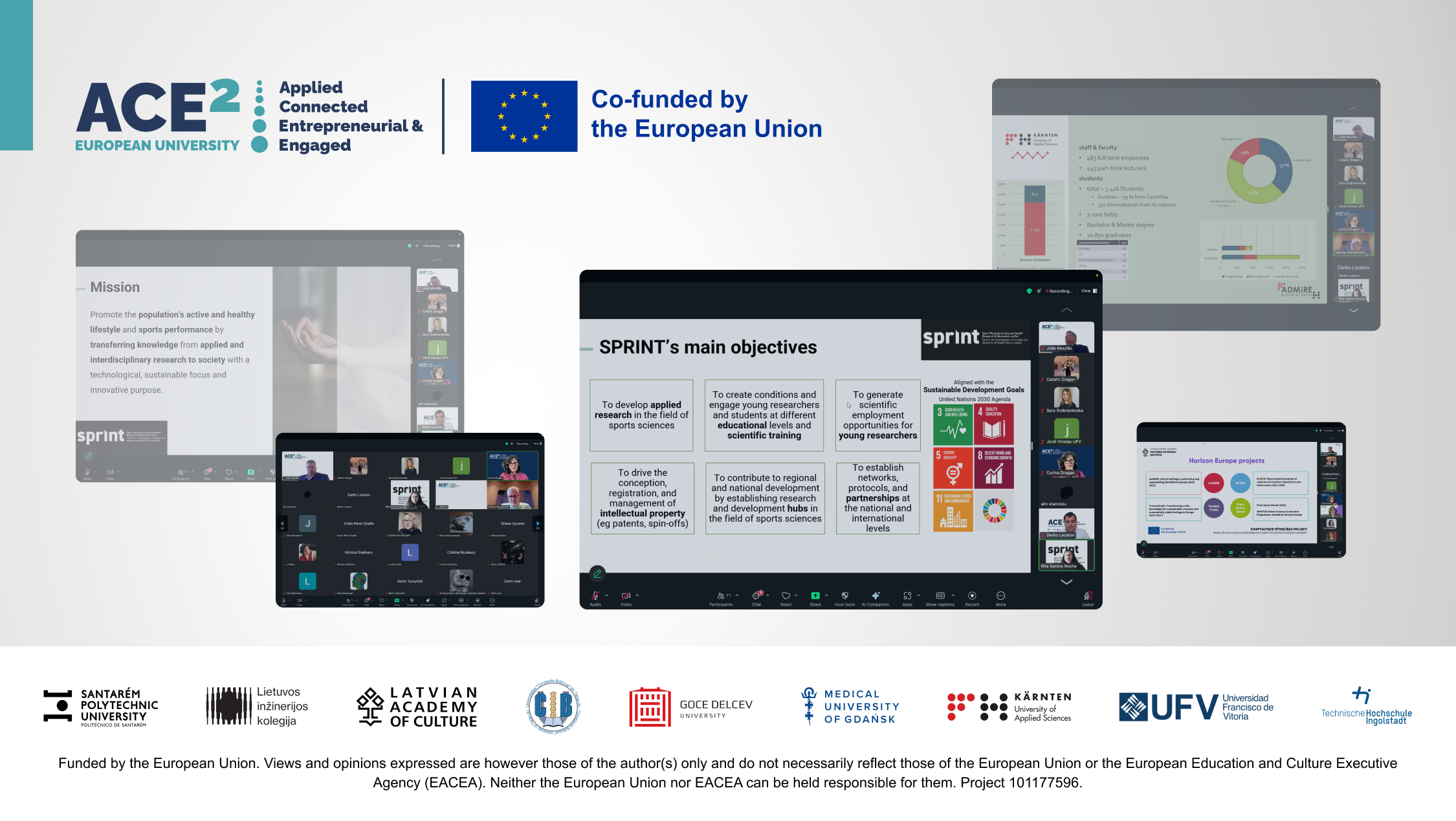Highlights from the ACE2-EU Virtual Town Hall Meeting – March 31, 2025

On March 31, 2025, the ACE2-EU Alliance hosted a successful Virtual Town Hall Meeting, coordinated by Work Package 8: Communication, Dissemination and Impact.
Over 100 participants – including students, researchers, faculty members, social workers, psychologists, and legal professionals – joined the session, reaffirming the alliance’s mission to promote transdisciplinary collaboration in research.
The event featured presentations from representatives of various institutions within the ACE2-EU Alliance, focusing on their research infrastructure, interdisciplinary priorities, and strategic directions.
Key highlights included:
- João Moutão, President of Santarém Polytechnic and ACE²-EU Project Coordinator, who delivered the opening remarks.
- Julia Marinachio, institutional coordinator of CUAS (Austria) in ACE2-EU Alliance The Plan for the ARIES Incubator’s Entrepreneurial Traineeship
- Insightful presentations from representatives of institutions including CUAS (Austria), UFV (Spain), LAC (Latvia), LIK (Lithuania), MUG (Poland), GUD (North Macedonia), IPSantarém (Portugal), and UCB (Romania).
Institutional Contributions
Universidad Francisco de Vitoria (UFV) – Motor & Sport Institute (MSI)
Jordi Viñolas Prat showcased MSI’s advanced infrastructure for engineering and automotive research, including:
- Wind tunnels, 7-post test rigs, and composite material labs
- Research groups in vehicle engineering, thermoacoustics, and advanced polymers
- Student projects on digital twins, solar vehicles, and industrial robotics
Baiba Tjarve, Deputy Head for Strategic Planning and Development- Institute of Arts and Cultural Studies of the Latvian Academy of Culture (LAC) introduced the main research areas of the institute:
- Cultural Heritage: research on tangible and intangible heritage, including the preservation of craft knowledge, sustainability, and accessibility
- Cultural and Civic Participation: public engagement in cultural processes, community involvement, and youth participation in cultural life
- Cultural and Creative Industries: sector development, innovation, policy-making, and economic impact, with a focus also on non-urban areas
- Digital Humanities: application of digital tools in the analysis, interpretation, and dissemination of cultural and humanities research
- Interdisciplinary Approaches to Arts Research: connecting arts research with sociology, anthropology, law, political science, history, and archaeology
Lietuvos Inžinerijos Kolegija (LIK)
Assoc. Prof. Vilda Grybauskienė presented LIK’s research centers in environmental engineering and sustainability:
- Climate-resilient water management and forest ecology
- Green urban planning and sustainable agriculture
- Electrical systems, eco-vehicles, and aircraft diagnostics
The institution also coordinates innovation projects with strong business partnerships.
Medical University of Gdańsk (MUG)
Prof. Michał Żmijewski presented the university’s Environmental Health and Toxicology research, including:
- Risk assessment for pesticides, food toxicology, and endocrine disruptors (e.g., apple peel barrier studies)
- Projects on microplastics and inflammatory bowel disease (IBD)
MUG is deeply engaged in interdisciplinary health research with global relevance.
Goce Delčev University, North Macedonia (GUD)
Prof. Darko Lazarov and Prof. Sara Srebrenkoska shared GUD’s impressive network of specialized laboratories:
- UNILAB (food safety), AMBICON (air quality), DROP (digital resources), KIENON (economic analytics)
- LMTT for mechanical testing, and LARIS for intelligent systems
With more than 12 faculties and numerous PhD programs, GUD is a key driver in regional R&D.
Polytechnic Institute of Santarém (IPS) – SPRINT Research Center
Presented by Prof. Rita Santos Rocha, SPRINT is a cutting-edge research unit in Sport Sciences, comprising 8 public institutions and 9 laboratories. It leads projects in:
- Sport performance and technology (e.g., NeuroTrain360, TOP, ACTIS)
- Physical activity across the lifespan (Move4Inclusiveness, GOLDEN AGE)
- Innovation in exercise, AI in motor function, and community-centered interventions
SPRINT emphasizes equality, inclusion, and sustainable innovation in sports sciences.
CUAS – ADMiRE Research Center
Mathias Brandstötter introduced the ADMiRE Center, focused on additive manufacturing, robotics, and smart engineering. Their research spans:
- Biodegradable and recycled materials
- 5D printing and robotic automation
- Medical and sustainability-focused innovations (e.g., iL3aD, Symbiotic RGB, PROTEA)
With strong industry ties, CUAS drives circular economy and digital transformation in production.
Constantin Brâncuși University of Târgu Jiu (UCB)
Cătălin Chimerel introduced a diverse set of research centers across six faculties:
- RESENERG: sustainable energy and ecological reconstruction
- KONRAD ADENAUER: public administration and e-governance
- AgroAlimTech: sustainable agriculture and food systems
- Health & Motricity: public health and physical performance
- Mechanical durability, economic development, and tech transfer are key pillars
The Virtual Town Hall provided a fertile space for sharing best practices and exploring interdisciplinary collaborations
